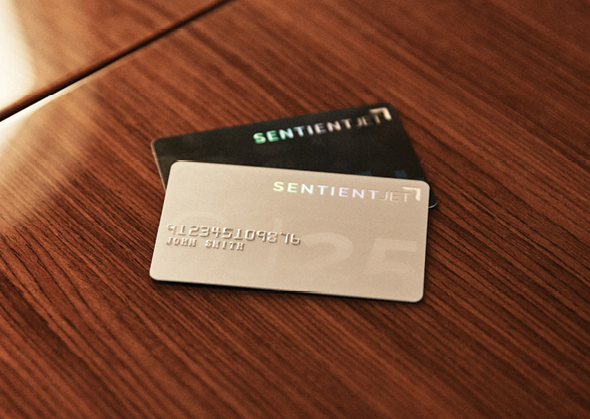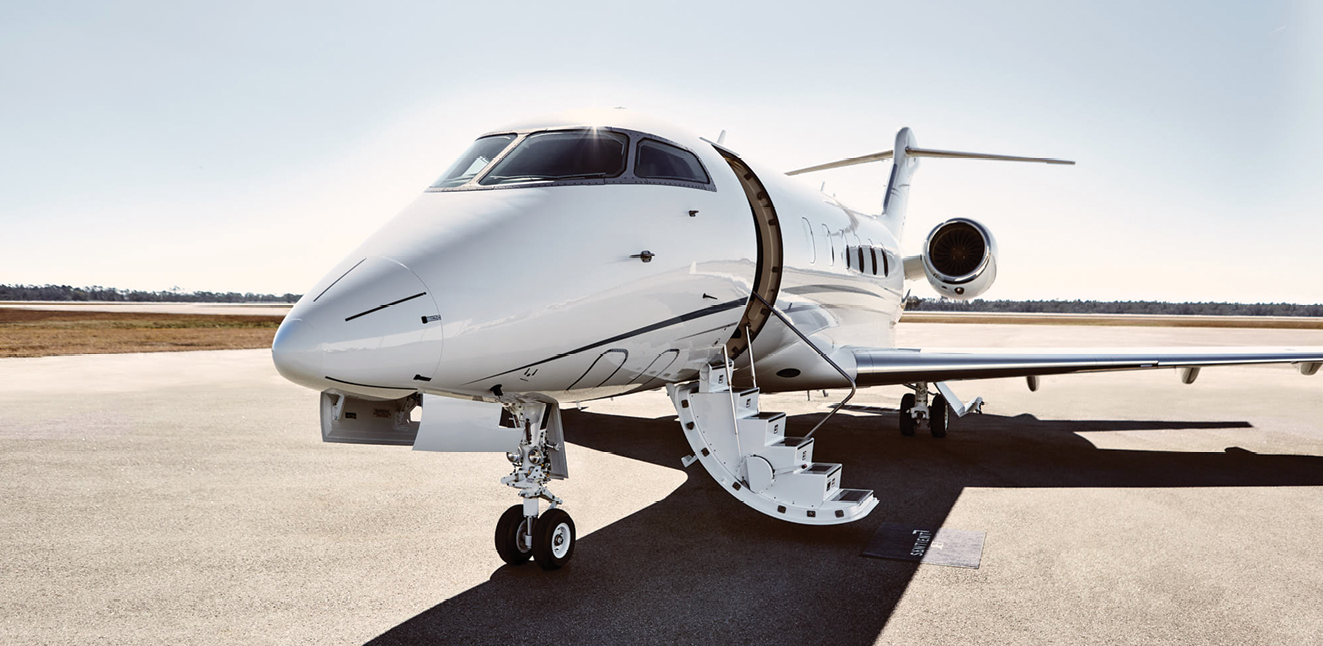- Home
- Media Kit
- Current Issue
- Past Issues
- Ad Specs-Submission
- Ad Print Settings
- Reprints (PDF)
- Photo Specifications (PDF)
- Contact Us

![]()
ONLINE

A More Thoughtful Way to Fly
Editors’ Note
As the President and CEO of Sentient Jet, Andrew Collins is responsible for a $350 million aviation business that has flourished over the last five years. Under his leadership, the company has benefited from both a digital and business model transformation, in addition to an organizational restructuring. This includes repositioning the brand, integrating a full suite of retail and wholesale technology applications, doubling Jet Card sales, and moving top-line revenues by 60 percent, while also evolving Sentient into an EBITDA-positive entity. In 2018, Collins, on behalf of parent company OneSky, led the acquisition of international digital charter provider PrivateFly (London, U.K.) to help establish a $100 million, on-demand global platform. In addition to helming Sentient Jet, Collins is also the Global Brand Leader for PrivateFly, acting as the team’s executive sponsor as this platform is further enhanced. In recent years, Collins has motivated a significant digital and technology transformation at Sentient Jet and its parent company, OneSky. This has included the creation of retail product, online consumer “touch points,” novel mobile applications, and a brand-new, supply-side platform for driving further efficiencies in flight-time procurement. Collins received his B.A. from Union College in Schenectady, New York, and a master’s degree from the Sloan School of Management at MIT.
Company Brief
Sentient Jet (sentient.com) has continued to perfect the jet card model for nearly 20 years as an alternative to jet ownership, fractional arrangements, and other jet card programs. Sentient Jet certifies every single aircraft, pilot, crew, and flight that flies in its program to ensure the safety of its clients. Operators are tested annually and the company’s safety standards exceed FAA Part 135 regulations in various categories. Supported by an extensive 24/7 customer service operation, Sentient Jet strives to make each private jet travel experience an extraordinary one.

Will you highlight the history and heritage of Sentient Jet and how the business has evolved?
Sentient spotted a need in the marketplace in 1999. This is interesting because if you’re an investor or if you look at business models, someone once said to me, you always want to be a painkiller and not a vitamin, where you’re solving something as opposed to just making somebody feel a little better.
At that time, there was a very fragmented charter market and, to some extent, it is still fragmented today. However, purchasing private jet time was not nearly as clear as it is today, and simplifying it and making it so that a consumer saw a reduction in the friction of trying to book a flight or have a solution provided a big opportunity. We created the Jet Card, which allowed a number of things to happen that productized a good portion of the industry in many respects since we created a one way rate that was different from the way others were billing at the time.
We guaranteed 10 hours advanced notification. At that point, we were competing more with the fractional groups like NetJets. Our creation stimulated an entirely new segment in the industry and our patch of grass became wider and more influential over time. What we’ve always done as a company, which was true back then and is true today, is that we’ve stuck to the Jet Card metaphor.
The idea was that someone could just purchase 25 or 50 hours at a time and have the flexibility of choosing anything from a light jet all the way up to a mid, super-mid or large cabin aircraft, and have that jet delivered to them within just 10 hours of advanced notice.
How do you define the profile of the Sentient Jet client?
I’ll answer that in two ways. There is a word that people are using these days where they’re saying they’re looking to democratize private aviation. I love that spirit and I think it’s a really smart vision. I would tell you though, with today’s aircraft, it’s very difficult to democratize at $5,000 an hour and up. We have 6,000 cardholders and will do $300 million in Jet Card sales this year. That is close to triple what we were doing in 2011 so we’ve been able to really grow the size of the company.
We foresee that the card product itself can be a $500 million product through organic growth without acquisitions, so it’s a significant piece of the private aviation landscape. I would reserve judgment as to whether it becomes a bigger market because it’s really going to be about the future aircraft available that are coming off the line and what the direct operating costs are.

Our market is a defined market and is one in which you have to think about how you look at the segment and how you acquire customers. If you overpay to acquire a customer in this space, it’s tough to make that up in volume over time. The way you really have to think about it is by defining how you rationalize your cost of acquisition and how you make sure everyone from your marketing team to your sales force is focused on a pool of discussions with individuals who can actually utilize the card and become long-standing clients.
Our average tenure for a client is four years, which shows that we have been able to develop a nice relationship with our base and have a true understanding of who they are.
How is technology impacting Sentient Jet’s business and how critical is it that technology does not take away from the human touch and personal relationship?
That’s a great question. My guess is that by next year we probably will have seen anywhere from $80 to $100 million in private aviation transactions that happen through our mobile app. This is a significant number in the industry, but it is not one which we necessarily run out and talk about because we have a captive membership base. What we’re looking to do is to unlock different ways we can work with, partner with, and communicate with our cardholders.
There is a swath of our client base that are very digitally oriented and are used to doing things with their phones or on their desktop. We are launching a brand-new desktop booking site this month, which is a wonderful addition for this group.
On the other hand, we also have people that like the high-touch personal interaction. This embodies everything from hospitality and service levels to an innate and deep knowledge of our clients based on the records and archived data that we have and the client’s history, so it’s a mixture of both.

Are you providing broader services and opportunities for your members in addition to flying?
We are focused on being a more thoughtful way to fly, so our brand positioning and our relationship with our client is much deeper than just booking a flight. From the time that a black car service shows up at your house to bring you to the plane, through being in air and completing your flight, we’re the brand that’s representative of the whole experience.
We have to make sure that the logistics of that for the 6,000 cardholders that use us each day is as smooth as possible, and that requires the technical focus, but it also requires the 20 years of history and understanding of how to be both proactive and reactive in that process. We have a unique way of engaging our client base. For many years we’ve developed exclusive partnerships and benefits for our client base so the experience in some respects extends into things such as Sentient Jet being the official provider, for the first time ever, for the Kentucky Derby.
This partnership means that if you go to the Kentucky Derby as one of our clients, not only do you fly in and enjoy special amenities on board the aircraft, but you can attend a series of events that Sentient is hosting for you. You have access to a private suite, you have access to the paddock, you will likely get to see a race right from the rail, as well as having our brand ambassador, Bobby Flay, personally cook breakfast for 125 of our clients on the Saturday of the race.
We need to relate to our clients and we want to be in their lives, but we do not want to be intrusive. We try to align propitiously with what they are interested in, where they would like to head, and how they would like to transact, so it is more than just putting somebody on a jet. It really is about building a relationship.
This is a business with so many moving pieces. Are you able to enjoy the process and take moments to celebrate the wins?
I celebrate the wins. I have a short list of about 53 clients out of 6,000 for whom I personally watch and review every transaction they’re involved in. I can do that because of technology. I started here coming out of MIT as our product person. I was a director of product management and really got into digital strategy and I don’t ever want to lose those roots. For me to experience how a client is doing and what their sentiment is and learn from them is very important to me.
It is really important to celebrate. This is a business that’s 24/7/365 and we would be nowhere without our senior leadership team, our front-line client services people, and our flight planners. This year we’ve been acknowledging our 20th anniversary. Private aviation can be a complex business and it can be one that has a bit of a grind to it. We have developed an organization that understands not only the client, but also understands how to work well with one another as a team. If you don’t stop and celebrate that, you will lose that spirit of camaraderie and lose focus on our daily mission.![]()